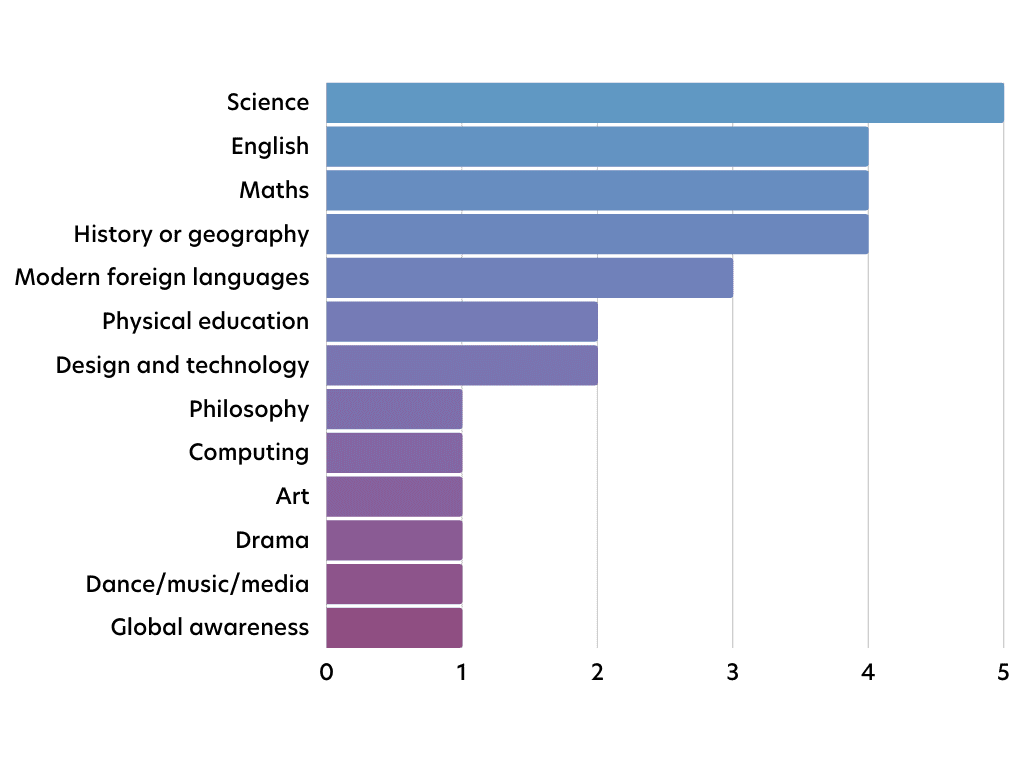In year 9 students have 30 lessons a week, these are allotted as follows:
Number of lessons per subject

Below is a general overview of the topics students are taught throughout the year in each subject.
After the February half term students pursue either GCSE history or GCSE geography, and have four lessons a week of their selected option. This helps develop student confidence, supporting student progress in their selected Ebacc humanities subject.
In the final half term of year 9 students begin to pursue all their GCSE options.
For a more in depth outline of each subject please click on the link for the subject page.
If you would like to speak to us about any aspect of our curriculum, or to request a printed version of our topic map, please get in touch.
Art
Identity Project:
• portraits
• objects
• landscapes
• final piece
GCSE introduction: food
Computing
• Heroes of computing
• Hour of code
• AppShed
• Future technology
• Trip planner
• The dark side of IT
Performing Arts
Students will choose to study Dance, Drama and/or Production tech
For more information
Design and technology
• Food- high skills
• Engineering- games controller
• Engineering- presentation stand
• Product design- set design
• Product- design trainer
Drama
• Devising from Stimulus
• Realism and Stage Combat
English
• Non-fiction writing
• Celebrating BAME authors (novel study)
• Descriptive writing
• Narrative writing
• Exploring writers’ viewpoints and perspectives
• Writing for specific purposes
• Writing for specific audiences
• Power and conflict in Shakespeare
• Comparative reading
Geography
• Development Dilemmas
• Asia Ventura : Place Detective
• Tectonic hazards
• Climatic hazards
• Resource management: energy
• Rivers
Global awareness
• CEIAG
• Relationships
• Being human
• Wellbeing
• Study skills
• Transition
History
• WW1
• The rise of the nazis and the holocaust
• History post WW2
• Medicine through time
• WW1: injuries, treatments and the trenches
Maths
• Standard form
• Linear graphs
• Algebra
• Surds and indices [H}
• Ratio and proportion – recap
• Direct and inverse proportion
• Congruence
• Loci and construction
• Simultaneous equations
• Statistics
• Pythagoras and trigonometry
• Quadratics
• Transformations
• Probability
Modern foreign languages
Students will study one of the following:
French
• Tourism
• Media and technology
• Culture and customs
German
• Film study
• Future plans/ jobs
• All about Germany
• Media
Spanish
• Healthy lifestyles
• Free time and technology
• The Hispanic world
Visit our modern foreign languages page for more information
Philosophy and ethics
• Multiculturalism
• P4C
• What is P&E like at GCSE?
• The holocaust and genocide
• Medical ethics
• Crime and punishment
Physical education
• Preparing for exercise
• Movement
• Developing technique
• Teamwork
• The benefits of physical activity
• Scoring systems
• Competition
• Officiating
• Tactics and strategies
• Methods of training
• Achieving a personal best
• Valuing physical activity
• Analyse a performance
• Fitness testing
• Leadership
• Making informed choices
Science
Biology
• Stem cells
• Cell transport
• Circulatory system
• Cell division
• System damage
• Plant transport
• Photosynthesis
Chemistry
• Periodic properties
• Subatomic particles
• Atom conservation
• Combustion
• Exo/endothermic
• Reactivity series
• Product life cycle
• Potable water
Physics
• Vectors
• Newton’s 1st law
• Acceleration
• Heat transfer
• Pressure
• Specific and latent heat
• Wave model
• Longitudinal and transverse
• Wave properties
